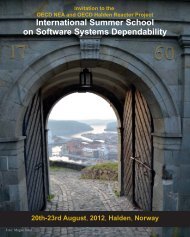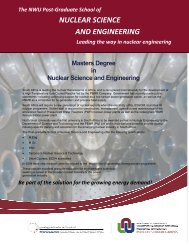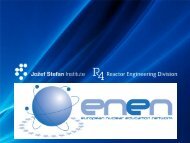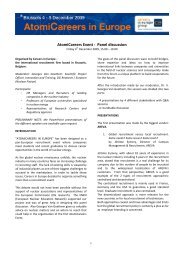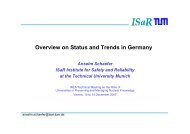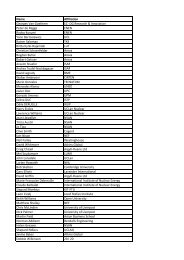Annex I Description of Work (April 2007) - ENEN Association
Annex I Description of Work (April 2007) - ENEN Association
Annex I Description of Work (April 2007) - ENEN Association
- No tags were found...
You also want an ePaper? Increase the reach of your titles
YUMPU automatically turns print PDFs into web optimized ePapers that Google loves.
Euratom 2005-6 – Fixed deadline<br />
Coordination Actions<br />
<strong>ENEN</strong>-II<br />
Partner 17 Gesellschaft für Nuklear Service (GNS)<br />
Partner 18 Deutsche Gesellschaft zum Bau und Betrieb von Endlagern für Abfallst<strong>of</strong>fe (DBE)<br />
Partner 19 CEA-INSTN- Institut National des Sciences et Techniques Nucléaires (CEA-<br />
INSTN)<br />
The National Institute for Nuclear Science and Technology ("Institut National des Sciences et<br />
Techniques Nucléaires" (INSTN) is a higher education institution created within the French Atomic<br />
Energy Commission ("Commissariat a 1'Energie Atomique", CEA) in 1956 and placed under the<br />
joint supervision <strong>of</strong> the Ministry <strong>of</strong> National Education, Research and Technology and the Ministry<br />
<strong>of</strong> Industry.<br />
The INSTN provides students with high scientific qualifications or pr<strong>of</strong>essional engineers<br />
specialised education in all disciplines related to nuclear energy applications and has in charge the<br />
co-ordination <strong>of</strong> PhD programmes in CEA laboratories. Furthermore, an international co-operation<br />
has been set up through specific programmes.<br />
The INSTN has various equipment, training tools and different laboratories with a sophisticated<br />
instrumentation. For instance: an experimental reactor Ulysse (power 100 kW), a 2 MV Van de<br />
Graaff accelerator, new generation PWR simulators (SIREP for normal operation; SIPACT for post<br />
accidental situations), scanning and transmission electron microscopes fitted with an energy<br />
dispersive X-ray analyser, simulation work sites for radiation protection..., and nuclear physics,<br />
metallurgy, radiochemistry and biology laboratories where INSTN students, along with top French<br />
engineering school students, acquire experience every year.<br />
The Institute has an in-house academic and administrative staff <strong>of</strong> around 100, plus the backing <strong>of</strong><br />
some 1,300 collaborators. Its 2005 budget was approximately 33 million Euros.<br />
The different curricula are designed to put students in direct contact with specialists <strong>of</strong> each<br />
discipline immediately involved in their daily activity. The INSTN relies on the CEA's vast research<br />
potential. Intensive interaction with specialists from different pr<strong>of</strong>essional and scientific<br />
backgrounds is essential to the INSTN's learning approach. Pr<strong>of</strong>essors and lecturers come from the<br />
University, CEA centres, EDF (French Public Utility) and from French nuclear companies,<br />
particularly from AREVA.<br />
The curricula are divided into two categories: academic courses and training sessions.<br />
Academic courses, mainly intended for graduate students, academic courses include a specialisation<br />
in Nuclear Engineering, Master programmes, medical studies and training for technicians. Every<br />
year, around 800 students attend the lectures.<br />
Training sessions (continuous training) are short-term training programmes (lasting a few days to a<br />
few weeks) designed for pr<strong>of</strong>essional engineers and researchers to up-date knowledge for those who<br />
already have a strong background in the applied field and to initiate a discipline to those who have<br />
specialised in other fields.<br />
In 2005, the INSTN thus hosted about 8 000 specialists for some 30 000 man-days <strong>of</strong> training in<br />
various fields : Nuclear power plants. Materials - Fuel cycle, Environment - Health physics,<br />
Security - Safety, Immunoassay - Radioisotopes use in biology - Molecular biology. Chemistry<br />
Analysis, Radiation Protection, etc.<br />
<strong>Annex</strong> I <strong>Description</strong> <strong>of</strong> <strong>Work</strong> - page 99 <strong>of</strong> 124



